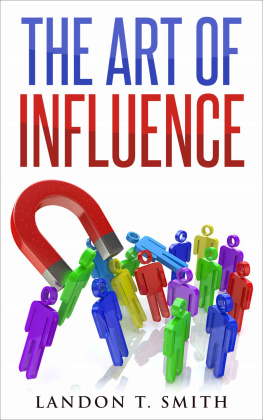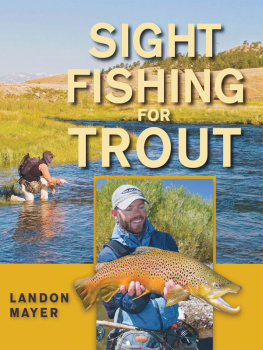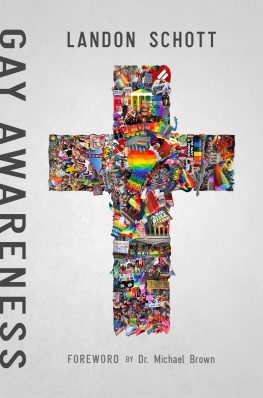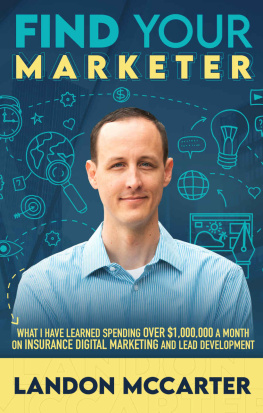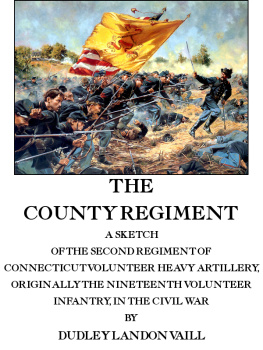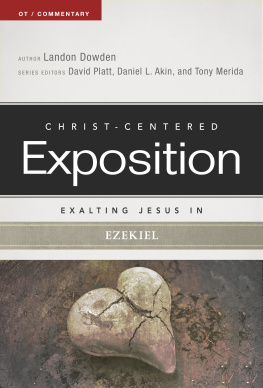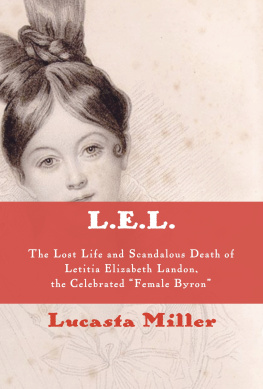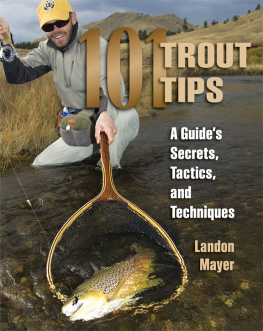Landon T. Smith - The Art Of Influence
Here you can read online Landon T. Smith - The Art Of Influence full text of the book (entire story) in english for free. Download pdf and epub, get meaning, cover and reviews about this ebook. year: 2017, publisher: Make Profits Easy LLC, genre: Business. Description of the work, (preface) as well as reviews are available. Best literature library LitArk.com created for fans of good reading and offers a wide selection of genres:
Romance novel
Science fiction
Adventure
Detective
Science
History
Home and family
Prose
Art
Politics
Computer
Non-fiction
Religion
Business
Children
Humor
Choose a favorite category and find really read worthwhile books. Enjoy immersion in the world of imagination, feel the emotions of the characters or learn something new for yourself, make an fascinating discovery.
- Book:The Art Of Influence
- Author:
- Publisher:Make Profits Easy LLC
- Genre:
- Year:2017
- Rating:4 / 5
- Favourites:Add to favourites
- Your mark:
- 80
- 1
- 2
- 3
- 4
- 5
The Art Of Influence: summary, description and annotation
We offer to read an annotation, description, summary or preface (depends on what the author of the book "The Art Of Influence" wrote himself). If you haven't found the necessary information about the book — write in the comments, we will try to find it.
The Art Of Influence — read online for free the complete book (whole text) full work
Below is the text of the book, divided by pages. System saving the place of the last page read, allows you to conveniently read the book "The Art Of Influence" online for free, without having to search again every time where you left off. Put a bookmark, and you can go to the page where you finished reading at any time.
Font size:
Interval:
Bookmark:
The Art of Influence
By Landon T. Smith
Copyright 2017 by Make Profits Easy LLC
profitsdaily123@aol.com
Table of Contents
Influence! We all need it, we all want it, but not many of us understand just what exactly it is. To some people influence is seen as some kind of mystical power that can be exuded on others, allowing you to control those within your reach. Some see influence as some kind of charisma, but the reality is that influence is just simply defined as the ability to have an effect on someone else. This definition is broad, but thats a good thing. The truth is that we all influence people in our lives on a daily basis. We all have an effect on other people, no matter what we do.
The point of this book is to take a look at what kind of effect that we want to have on others. Do we want to be able to effectively persuade other people? Do we want to be able to affect people for the better? When we say that someone is influential, what we really mean is that they are able to influence people for the better. The most influential people in society are those who are capable of enacting a great deal of change in others, so much so that it has had an influence on the world itself.
The question isnt how can I be influential, the question is: how can I be effective with the influence that I have? How can I get the results that I want with my influence? The more you focus on increasing your ability to affect other people, the greater your influence on them will be. So, the focus of this book isnt about giving you quick and clever tricks that will help you manipulate people, rather the focus of this book will be to help you understand how influence works, how to increase the results from our own influence and most importantly, how to improve your own influence. If youve always wanted to be a more influential person, then get ready!
The first step to being able to influence people is being able to understand how the mechanics of influence work. We tend to think of influence as some kind of supernatural force, something that will exude from your words or actions and end up convincing another person to do your bidding. As stated before, this is a fallacy and tends to come from the false idea that people can be somehow controlled by our words or actions.
The reality is that people are extremely in control of their own minds, thoughts and actions, so in truth, we dont have the ability to do some kind of clever manipulation tricks to make them do our bidding. What we do have, however, is the ability to appeal to them on various different levels. The basics of human motivation is extremely simplistic. People do what they want to do. Simple as that. There are ways to get a person to do something that they dont want to do, such as threatening them, coercing them, paying them or tricking them, but then again, that isnt influence at all. That is what is known as manipulation. Manipulation and influence are not the same at all. A person who influences others gets long lasting results from the people that they are influencing. Someone who chooses to manipulate others will only get short term results and will most likely end up dealing with the consequences of their unethical behavior later on. Essentially, if you are someone who wants to get the best deal for your efforts, then it is a much better idea to learn how to influence people instead of focusing on trying to manipulate them.
As stated before, people are entirely in control of their own actions. Many times, we can harbor the false belief that people are not rational actors, meaning that they do things without knowing why, they are controlled by their emotions and dont really have a free choice in what they do, but this belief is a flawed premise. No matter what a person is feeling, experiencing or thinking, they always have a choice when it comes to decision making. What happens is that many people try to explain that they have no choice in decision making as a way to escape from the responsibility of their own decisions. But these are nothing more than excuses. An excuse is not a reality. So, when someone says I cant help it! they actually can help it, but they are just giving in to an excuse.
Since people are rational actors and are in complete control over the decisions that they make, how then, do they make decisions? Why do people do the things that they do? This requires a simple understanding of human psychology and motivation. Essentially, people make decisions based on their beliefs. A belief is a long term understanding of how the world works, usually formed at different periods in a persons life. For example, when you sit in a chair, you believe that the chair will support your weight. You have no logical way of knowing that the chair will support you other than the fact that you have observed many times over your life the fact that the chair will support you. This is the basis of a belief, that the world works a certain kind of way.
So, all of our actions and decision making take our beliefs into account first. After the beliefs, come our emotions, understanding and logic. Beliefs and emotion have much more to do with decision making than logic and rationality do. This might seem somewhat backwards, but it is a reality. When someone believes that a decision will hurt them, it doesnt matter about any of the reality or truth, they will behave accordingly. For example, if someone is trying to get into a cold pool, they might be reticent to do so because they believe it is extremely painful to get into the cold water. The reality is that cold water is uncomfortable, but it is not painful. Yet when the person under the false belief must confront the truth, they will try to shape the current situation to match their own beliefs instead of adapting to a new way of thinking.
This can be summed up by an old joke. A man goes to see a psychiatrist and tells the doctor, Doctor, I am a corpse. I died just a few days ago, and now Im dead. The psychiatrist, seeing that the man is living and breathing says to the man well, everyone knows that a corpse doesnt bleed, right? Of course, the man replies, a corpse doesnt bleed! Well, the psychiatrist, trying to prove a point to the man takes a needle and gently pricks the mans finger, causing a tiny droplet of blood to emerge. The man looks at the blood and says Well I guess a corpse does bleed!
When people are forced to confront things that challenge their beliefs, they tend to distort the facts so that it matches up with what they believe, rather than form new beliefs. Why? Well, the human brain is designed in such a way as to retain information and patterns and its not particularly interested in deleting old information. So, when we experience things that challenge us, unless we desire to have an open mind and really look at those things, our beliefs do not change. We just react differently based on our beliefs.
After belief comes emotion. Our beliefs color how we see things, but our emotions color how we feel at any given moment. There are some people in this world who are primarily seen as very emotional creatures due to the fact that they are always crying or getting upset, then there are those who are seen as stoic and emotionless due to the fact that they dont display their emotions outwardly too much. The reality is that both of those kinds of people equally are emotional, they just display their emotions differently. People tend to respond to situations based on the way their emotions are driving them. Someone who is primarily in an angry emotion will respond with anger or irritation, someone who is happy might respond to things favorably.
After our emotions, comes logic and reasoning. We consider facts, but only after we are able to look at them without feeling afraid, threatened or having a conflict with our beliefs. This means that the majority of people in the world dont particularly change based on facts. They tend to change based on the way they feel about the facts. Those who are particularly well trained and who are open minded might be able to put their emotions aside as they pursue truth, but if someone is closed off to learning a new perspective, there are no amounts of facts that will change a persons mind. Only experiential things will help a person change their closed minds.
Next pageFont size:
Interval:
Bookmark:
Similar books «The Art Of Influence»
Look at similar books to The Art Of Influence. We have selected literature similar in name and meaning in the hope of providing readers with more options to find new, interesting, not yet read works.
Discussion, reviews of the book The Art Of Influence and just readers' own opinions. Leave your comments, write what you think about the work, its meaning or the main characters. Specify what exactly you liked and what you didn't like, and why you think so.

